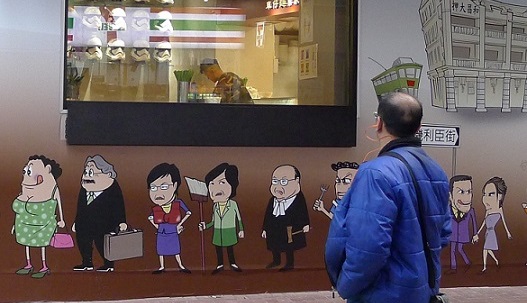Reviews & Articles
希望與小奇蹟 ∣ Hope and Small Miracles
John BATTEN
at 9:57pm on 21st March 2017

Caption:
Man looking at cartoon of Chief Executive election candidates on wall of a Sheung Wan noodle shop, Sheung Wan, Hong Kong. (photograph: John Batten)
(Please scroll down for English version)
雖然我內心很想看到新人事新作風,但相信特首選舉過後應該不會有太大轉變。最清楚顯示這點的,就是誰被選進政府的諮詢委員會和顧問委員會,這些席位是香港最多人希望得到的人脈機會,但卻將一如既往。即時委任的是與政府部長一同列席行政會議的「非官守」成員。如果獲任命加入這些諮詢委員會的名字與以往的一樣,來自舊有的行業或界別,由同一群商家或他們的子女擔任,那麼任何政府政策、方針與溝通上的改變也都只是希望渺茫。現存的「他們」和「我們」分野將延續下去。毋庸置疑,未來很多官方決策將與公眾想法與期望有很大落差。
我們只可以懷著希望生活。又或者我們可以相信小奇蹟終會出現。這類陳腔濫調的說法帶有一些宗教意味:命運是在超然力量的掌握中。這些也是賭徒在擲骰子和馬匹即將過終線時口中唸唸有詞的想法。香港現時的負面情緒不應該成為自我實現的預言。那麼,就像睹徒一樣,讓我說一下自己對下任特首的期望和一些最卑微的希望,包括:
我希望下屆政府不再標籤所有反對政府政策人士為「反對派」,而且理性問題不會被指含抹黑成份而被拒絕受理。跟反對派對話,好好談談。我也希望立法會裡「非建制」的議員可以繼續質詢、推翻和說服明顯欠佳的政府政策,而且覆行反對派的影子政府的責任。
我希望下屆政府除下現於所有政府辦事署、政府設施(例如醫院和消防局,和更重要的警署)上飄揚的旗幟。這些被施加一致規格,在三年前揚起的旗幟,並不代表我城獨有且讓我們引以為傲的「一國兩制」管治;他們只象徵梁振英政府和關係密切人士所施加的愛國主義。 梁振英政府的一項特色,是扼殺既有制度––看看警察、司法機關、學校––他們只求在這些此前受人敬重的獨立機構推動愛國議程。現在是時候把情況扭轉。
我希望下屆政府可在紅磡 巴士站拆走「公眾秤車站」,因為它現在佔據了整條海底隧道向港島方向的行車線,引起不必要的交通擠塞,突顯了沒有任何交通部門官員能作出簡單決定。它每天都在提醒上班族,政府不斷拒絕為我們有更好的生活而作出讓步。公眾步道和巴士站缺乏座椅是另一個顯而易見的例子。
我希望下屆政府可以審視如何令擠滿公立醫院普通病房的年長病人臨終前好過一些。為什麼我們不能夠撥款在公立醫院設立善終病房,在病人生命最後幾個星期提供紓緩治療,讓親友得到亟需的私隱?
我希望下屆政府停止現屆政府常常掛在口邊的房屋口號。香港並不缺乏住宅用地,問題在於如何善用土地。事實上,現時香港的道路專用土地比住宅用地還要多。我們可以發揮創意:在部份住宅的地底地基設置道路,騰出地面空間給行人使用,這樣也可以把以往撥給汽車的用地釋放。又或者可以採取更激進的方式:解決新界的村屋政策,又或透過類似市區重建局在市區收地時使用的法例,重啟發展商的鄉郊土地儲備。當然,房屋應該是市民有能力負擔的:現時的高地價政策(例如最近政府接受啟德用地的投標)加上歷史低位的利率,都是令房屋價格居高不下的原因。
我希望下屆政府可以實施以人為本的政策,令市民生活得更好,令香港更加宜居。
最後,我希望下屆政府和特首可以有多點幽默感。我想聽到一些「爛gag」,最好有時候妙語連珠,有時候又說一些帶點睿智的小故事,然後看到特首會大笑,與市民一起笑得更多。那時候,我們便可以一同更輕鬆、更快樂地享受未來五年。
原文刊於《明報周刊》,2017年3月18日。
Hope and Small Miracles
John Batten
As much as I wish it, not much will change after the Chief Executive election. The clearest indicator that it will be business as usual is seeing who are the new appointees to Hong Kong’s most coveted networking opportunities: sitting on government advisory boards and committees. The immediate appointments will be ‘non-official’ members sitting alongside government ministers on the Executive Council. If these advisory committee appointments carry the same old names, from the same old business or sector alignments, the same businessmen or their children, then there is little hope for any change in government policies, direction and communication. The prevailing ‘them’ and ‘us’ continues and much future official decision-making will undoubtably be at odds with the public’s own ideas and expectations.
We can only live in hope. Or, we can believe in small miracles. These sort of clichés have a touch of religion: destiny is in the ‘hands’ of a higher force. It is also the thoughts a gambler mumbles just before the dice rolls or the horses approach the final straight. Hong Kong’s prevailing negativity should not be a self-fulfilling prophecy, so, like the gambler my expectations of the next Chief Executive and government have some modest hopes. These include:
I want the next government to not label everyone who opposes government policy as ‘the opposition’ and that sensible questions are not dismissed as being behind ‘a smear.’ Talk to the opposition, talk together. And, I would like members in the Legislative Council who are not ‘pro-government’ to continue to question, push and cajole obvious bad government policies and to be an Opposition, to be and act as an alternative government.
I want the next government to take down the flags that now fly above all government offices, government facilities such as hospitals and fire stations and – significantly – police stations. These flags, of imposed regulation size and erected three years ago, don’t represent the city’s unique ‘one country, two systems’ way of governance we can all be proud of, but represent an imposed nationalism by the Leung Chun–ying government and cronies. A feature of Leung’s government is its chipping away at established institutions – think police, the judiciary, schools – to push a nationalist agenda on previously, and fiercely proud, independent institutions. It is time to reverse this.
I want the next government to remove the ‘public weigh station’ at the Hung Hom bus stop that blocks one lane for cross-harbour buses approaching Hong Kong Island, causing unnecessary traffic congestion. It seems no transport official will make this simple decision. It is a daily reminder for commuters of continuing government intransigence to make daily lives better. The lack of public seating along public footpaths and at bus stops is another glaring example.
I want the next government to look at how we can make the final living days of elderly patients that crowd general medical wards at public hospitals better. Can’t we fund hospice-style wards attached to public hospitals, to offer palliative care and give families and friends needed privacy in the final days or weeks of life?
I want the next government to stop the housing mantra that has been a feature of the present government. Hong Kong does not lack land for housing, it is how our land is used. More land is actually devoted to roads than residential property. Let’s be innovative: some residential projects could incorporate roads within its underground foundations, leaving ground level space for people and freeing up land previously devoted to cars. Or, be even more radical – tackle the New Territories small house policy or resume property developers’ rural land banks using similar resumption laws as used in urban areas by the Urban Renewal Authority. And surely housing should be affordable: the current high land cost policy (e.g. recent acceptance by government for Kai Tak land tenders), and historically low interest rates, have kept housing expensive.
I want the next government to have people-centred policies, to make lives better and more livable.
And finally, I want the next government and the Chief Executive to have a sense of humour. I want to hear some really bad jokes, smart quips, witty anecdotes and to see the Chief Executive laugh and laugh with us more. We can then all enjoy the next five years a little easier and a little happier.
This article was originally published in Ming Pao Weekly, 18 March 2017. Translated by Aulina Chan.
